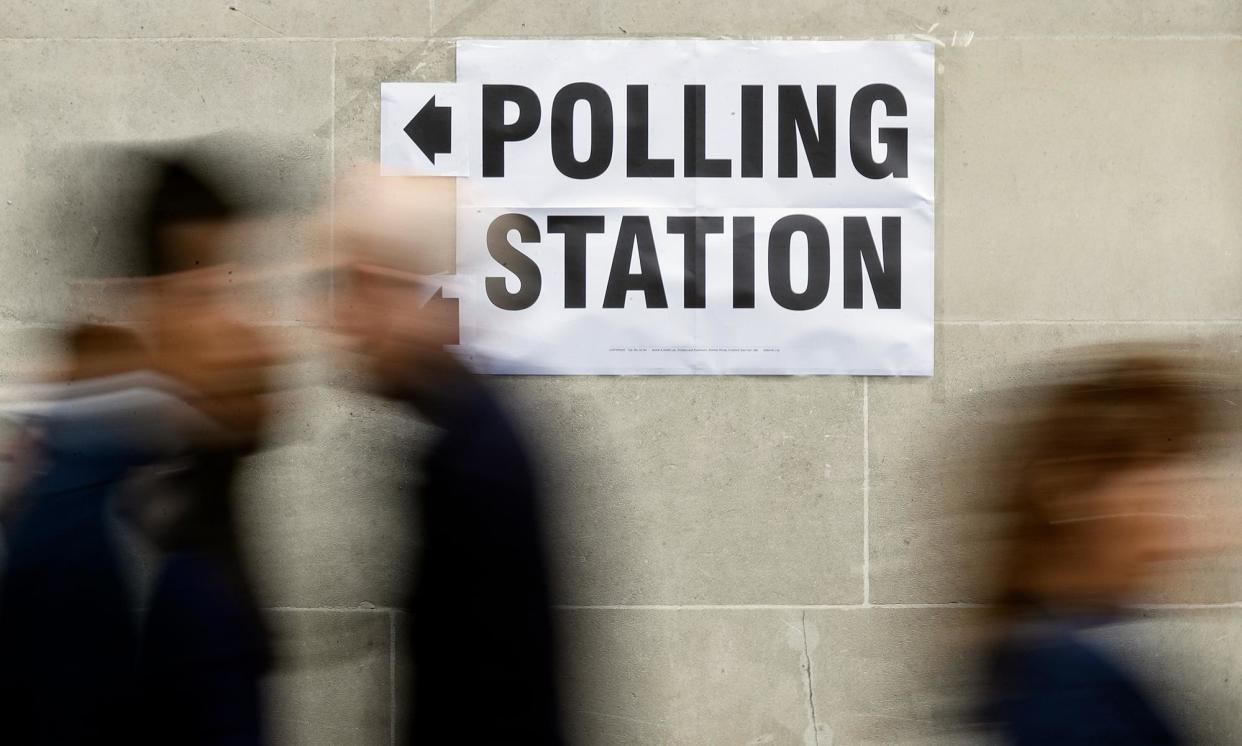Polling stations open across UK for general election

Keir Starmer, Rishi Sunak and Ed Davey have cast their ballots as voters across the UK head to the polls in a general election that is expected to produce the first Labour government in 14 years.
The Labour leader and his wife, Victoria, appeared to have a spring in their step, smiling, as they made the short journey on foot from their home to vote in the Holborn and St Pancras constituency.
The prime minister, who has been urged to stay on as Tory leader irrespective of how badly the Conservatives lose, was also joined by his wife, Akshata Murty, arriving at their Richmond polling station in a Range Rover.
The Liberal Democrat leader waved to cameras as he voted in Surbiton with his wife, Emily, saying “good morning everybody” to the media gathered outside.
It comes as polling stations in 650 constituencies across England, Wales, Scotland and Northern Ireland opened at 7am. Counting will begin immediately after they close at 10pm, with results announced in the early hours of Friday morning.
Writing on X as the polls opened, Starmer, said: “Change. Today, you can vote for it.” Sunak posted a series of messages on the same site that urged voters to “stop the Labour supermajority”, which he claimed “would mean higher taxes for a generation”.
The Lib Dems tweeted: “This election is our chance to win the change our country desperately needs.” The SNP tweeted: “VoteSNP to deliver independence, rejoin the EU, scrap the two-child benefit cap, invest in the just transition, protect free tuition.”
The contest closes six weeks of campaigning after a five-year period in which the UK has had three Conservative prime ministers.
default
Labour has maintained its 20-point lead in opinion polls for the entirety of the election campaign and is hoping to make huge gains across England, Wales and Scotland. A YouGov poll published on Wednesday night said Starmer’s party was on track to win its largest majority in modern history.
Senior Tories including one of Sunak’s closest cabinet allies were effectively conceding defeat on Wednesday. Starmer accused the Conservatives of trying to suppress voter turnout by presenting the election result as a done deal.
Labour is seeking election on a platform of change, and has promised to create a new publicly owned energy company, nationalise the railways, cut net migration, recruit 6,500 teachers and create more than 100,000 new nursery places.
The Conservatives have promised to introduce compulsory national service for 18-year-olds, introduce an annual cap on migrant visas, recruit 8,000 police officers and cut a further 2p off national insurance with a view to abolishing it.
It would mark an unprecedented turnaround from the last election, held in December 2019, when Boris Johnson defeated Jeremy Corbyn to win an 80-seat majority for the Conservatives. His campaign was centred on the promise to “get Brexit done”.
Less than three months into his premiership, Johnson had to contend with the Covid-19 pandemic. He resigned in July 2022 after losing the confidence of his MPs due to a string of scandals including Partygate and the handling of internal misconduct allegations.
Johnson was succeeded by Liz Truss in September 2022, but her disastrous premiership lasted only 45 days. She was forced to resign after presenting a mini-budget that lost the confidence of the markets and caused the value of the pound to plummet to a historic low.
Sunak, who was defeated by Truss in the 2022 Conservative leadership contest, took over but has failed to turn the Conservatives’ fortunes around.
Starmer has been in office since April 2020 and has brought about a dramatic and ruthless transformation of his party during that time. He suspended Corbyn, in whose shadow cabinet he served, who is seeking election as an independent candidate in Islington North.
Several of the smaller parties – the Liberal Democrats, Greens and Reform UK – are projected to perform well in this election.
Ed Davey, the Lib Dem leader, has fronted a stunt-driven campaign that polls say is due to deliver dozens of seats in Conservative strongholds. The Liberal Democrats have pledged to introduce free personal care in England, give everyone the right to see their GP within seven days and ban sewage discharges into rivers and seas.
The Greens are targeting disaffected leftwing voters in four seats including Bristol Central, which is being defended by the shadow culture secretary, Thangam Debbonaire. Their policies include a wealth tax on assets of more than £10m and bringing railways, water companies and the big five energy firms into public ownership.
Reform UK is projected to win up to three seats, despite uproar about several of its candidates’ and activists’ racist and misogynistic remarks. Pollsters say Nigel Farage is likely to enter parliament on his eighth attempt with a victory in Clacton-on-Sea. His party wants to freeze immigration – except for those with essential skills – and end policies designed to reach net zero.
A total of 650 MPs will be chosen under the first-past-the-post system, where the candidate who secures the most votes in each seat is elected. To win an overall majority, a political party must win more than half of these seats: at least 326.
All British citizens aged 18 or over are eligible to vote, as are citizens of Commonwealth countries and Ireland who are resident in the UK. Voters must have registered to vote in advance and must take a valid form of voter ID to the polling station.


